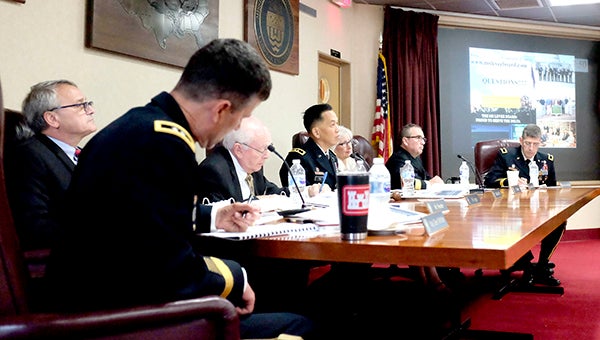Mississippi River Commission urged to make backwater pumps ‘top priority’
Published 5:16 pm Wednesday, August 21, 2019

- Members of the Mississippi River Commission hear testimony during a meeting Wednesday aboard M/V Mississippi while it was docked at the Vicksburg Riverfront in 2019. (Courtland Wells/The Vicksburg Post)
The U.S. Army Corps of Engineers needs to put all its efforts toward providing the necessary environmental information to get Environmental Protection Agency officials to reverse their veto of the Steele Bayou Control Structure, the Mississippi Levee Board’s chief engineer said.
The pumps “are our top priority issue and it’s got to be completed in the next couple of months,” Levee Board chief engineer Peter Nimrod told the members of the Mississippi River Commission. “We cannot wait around … we’ve got to get these reports (on the pumps) out. We need everybody jumping in so the EPA will do the right thing and turn this veto around.
“Push the right buttons, talk to the right people; let’s get this project done.”
Nimrod’s comments came during a public hearing held by the commission Wednesday in Vicksburg. The public hearing is part of the commission’s annual low-water tour.
Vicksburg was the third meeting on the tour to hear public concerns and questions.
“You guys designed the project; you know all about it,” Nimrod added. “There are no environmental losses with this combination project in place. In fact, there are almost double-digit increases in every environmental resource standpoint. If you don’t build this project, you’re hurting the environment.”
The pump station was the final piece of the Yazoo Backwater Project authorized by Congress in 1941. The major piece of the project was the Yazoo Backwater Levee, completed in 1978.
The pumps were expected to move 14,000 cubic feet of water per second from the land or Delta side of the structure to the riverside if and when gates were closed due to high river stages. The pumps were vetoed by the Environmental Protection Agency in 2008.
Nimrod called the lack of the pumps, which could have helped the backwater flooding, a travesty.
During the backwater flooding, he said, the flooding in the backwater reached 98.5 feet; putting three major state highways, 465, 1, and 16 underwater, and flooding 548,000 acres of farmland.
Had the pumps been in operation, he said, the flood level would have been 92.5 feet, and fewer acres of cropland would have flooded.
“No homes would have been flooded at all if you had the pumps in place, and those highways would not have been underwater,” Nimrod said. “We’ve got to have this project.”
The commission’s tour comes several weeks after the Mississippi River receded from one of the worst floods on record.
“This flood was unprecedented and record-setting,” Maj. Gen. R. Mark Toy, commission chairman and Mississippi Valley Division commander, said.
Toy said the Division has been in a flood fight since Dec. 1, adding, “For the first time in a long time, it has been over 200-plus consecutive days of flood fighting.”
He said 2019 was the wettest year in 129 years — since 1895.
“We had record consecutive flood stage for everybody across the Mississippi Valley Division,” he said. “When our teams have gone out to look at the damage, the damage has been significant in some areas, and what our teams have recorded is over $800 million worth of damage.
“As the river stages continue to drop, and it starts to dry up and we assess even more of the damage, we project over $1 billion worth of damage that will occur from just this flood year.”






